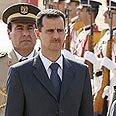
Assad dismisses Israel demands over Iran
Syrian president tells British MPs his government intends to maintain its 'normal relations' with Tehran while it conducts indirect talks with Jewish state to regain Golan Heights
Assad told British MPs that the Baath Party government intended to maintain its "normal relations" with Iran while it conducts indirect talks with Israel to regain the Golan Heights, a source familiar with the meeting told Reuters.
Israeli officials have repeatedly said that the peace agreement depends on Syria distancing itself from Iran, and severing ties with Lebanon's Hizbullah movement and Palestinian group Hamas. The two organizations are also supported by Iran.
"The president said Syria has normal relations with Iran. He made it clear that any suggestion to drop them was not a reasonable request," the source said.
"He said if Israel could question Syria's relations with Iran then Syria could question Israel's ties with other countries, particularly the United States," the source added, referring to Israel's main ally.
The parliamentarians, including former home secretary and Labor party member Charles Clarke, are on a trip to Syria to hear first hand the country's take on the Middle East.
Syria and Israel said last week they were having indirect talks mediated by Turkey, the first confirmation since 2000, when talks collapsed over a proposed Israeli withdrawal from the Golan, a fertile plateau occupied by Israel four decades ago.
A week after the announcement, Syrian Defense Minister Hassan Turkmani visited Tehran to discuss closer military cooperation, Syrian government newspapers said.
Hamas leader Khaled Mashaal, who lives in exile in Syria, also made a separate trip to the Iranian capital.
The official Syrian news agency said Assad underscored to the British delegation need for "comprehensive peace and full restoration of rights," a reference to the Palestinian quest for a state on all the land Israel occupied in the 1967 war.
Mashaal said in Damascus last month that Hamas was willing to accept a state on 1967 borders as part of a long-term truce with Israel, but it was not prepared to recognize the Jewish state.
Syrian officials said the statement reflected a softening of the group's position. Foreign Minister Walid al-Moualem said in Tehran that Palestinian rights must be safeguarded but that Syria needed to make peace with Israel.
'Progress will encourage Israel-Lebanon talks'
The alliance between Syria and Iran dates to 1980, when Damascus, alone in the Arab world, sided with Iran during the Iran-Iraq war.
Syria reinforced its links with the Islamic Republic over the last few years to counter pressure from the United States, including sanctions imposed by Washington in 2004.
Syria's link with Hizbullah contributed to an expansion of US sanctions on Syria and increased isolation from the West, but European officials praised Syria for its role in this month's agreement that ended the political crisis in Lebanon.
Assad said progress on the Syrian-Israeli peace track would encourage Lebanon and Israel to initiate their own talks.
"The president hinted that it would not be in Lebanon's interest if it did not have its own talks if Syrian-Israeli talks advanced," the source said.
Turkey said the indirect peace talks it is mediating could be upgraded to face-to-face encounters if progress was made.
Syrian forces pulled out in Lebanon in 2005 after a 29 year presence under international pressure following the assassination of former Lebanese premier Rafik Hariri, but Damascus retains influence, largely through Hizbullah.
Hizbullah and the Lebanese government say Israel occupies the Lebanese Shebaa Farms. The United Nations says Shebaa Farms is Syrian land occupied by Israel, not Lebanese.










